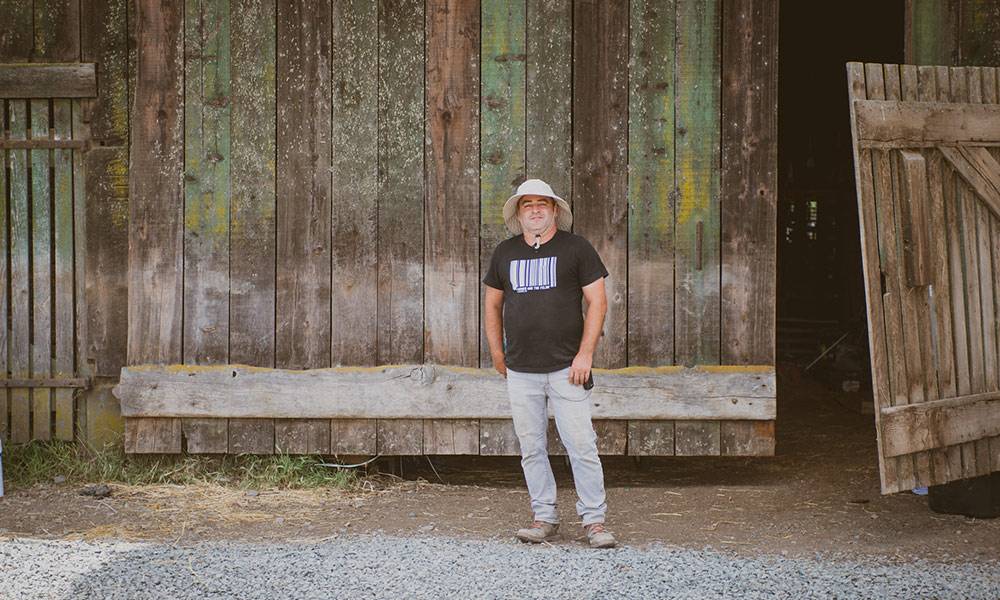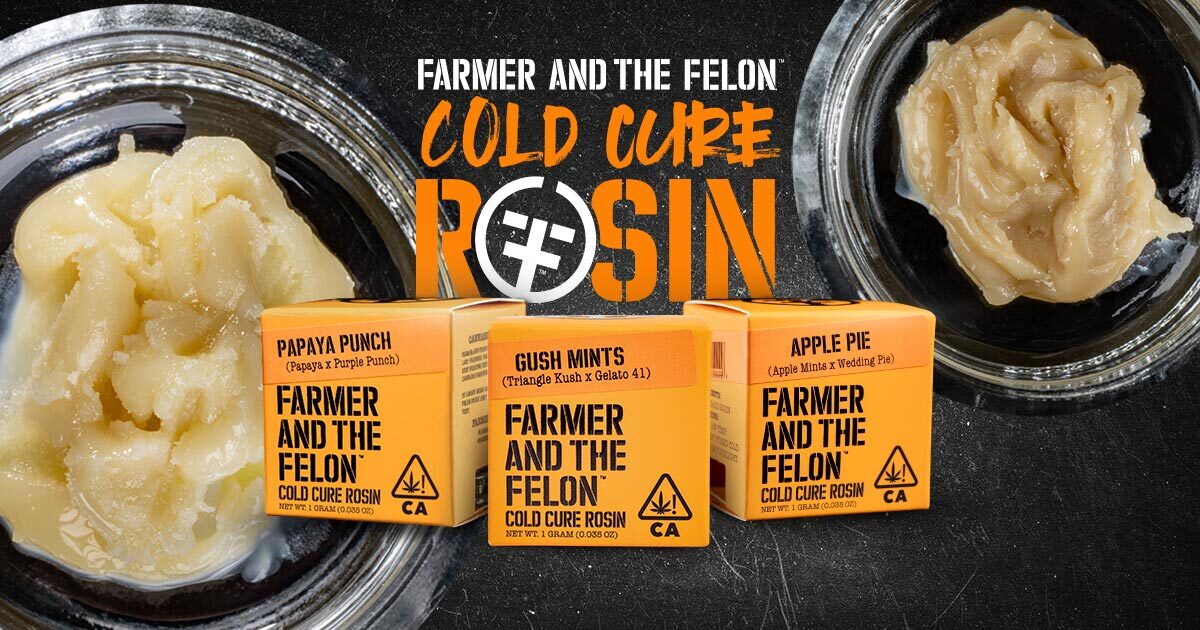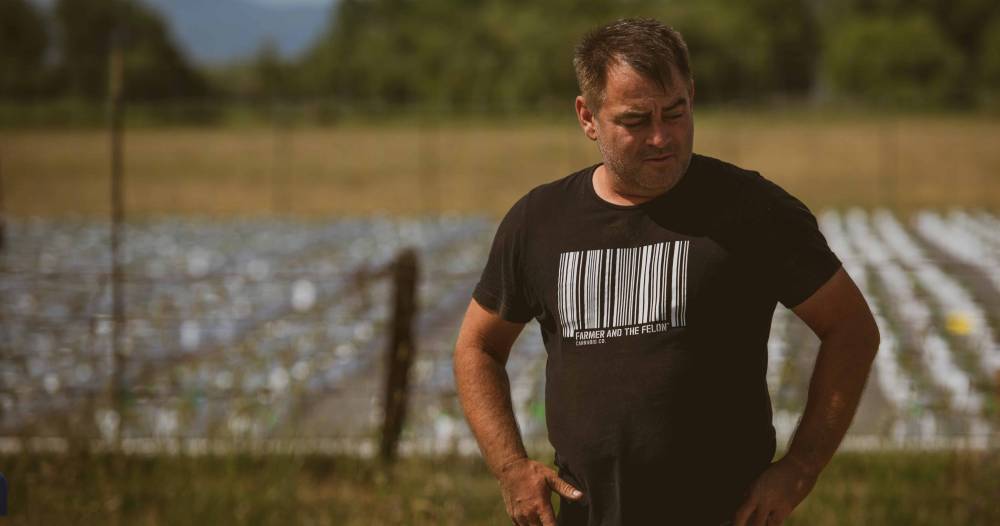Farmer Profile: Dennis
For our second edition of “Know Your Farmer,” we introduce another co-founder of the Farmer and Felon brand, Dennis Hunter.
Growing up in the Emerald Triangle, Dennis was exposed to cannabis culture at an early age. Through personal observation, Dennis noticed that the people who used cannabis as medicine and as a substitute for alcohol seemed peaceful, happy, and healthy, contradicting the anti-drug campaigns’ depictions. This official hypocrisy led Dennis to become an advocate for cannabis law reform.
As a teenager, Dennis’ career in cannabis started with a few small plants. A self-taught grower, his methods evolved to meet needs and solve problems, eventually leading to expertise in irrigation, electrical wiring, and plant spacing techniques. Eventually, Dennis was running one of the largest cultivation operations in California in the mid-90s, which led to a Federal bust, life on the run, and a stint in prison.
After serving 6.5 years in prison, Dennis went on to channel his knowledge of cannabis cultivation into ancillary cannabis products; founding Left Coast Garden Wholesale and creating well-known products such as Geopots and Terpinator. After meeting Ned Fussell, another longtime grower, the two joined forces to create CannaCraft in 2014, transforming the legal cannabis industry while building one of the largest and most diversified cannabis companies in California.

Tell us about your first experience farming cannabis?
DENNIS: I grew up in Willits, California. My first time growing was in high school. One of my good friends and I set up a garden in his backyard. We had plants everywhere. We'd come home from school at lunch to water them and take care of them. Unfortunately, we never saw a profit from our first harvest. We took a joyride in my friend’s mom’s car and totaled it. We ended up buying her a new car.
Did you grow up farming or working with the land?
DENNIS: Farming runs in my family. However, by the time I was born, my parents had several businesses and farming took a backseat. My parents are extremely hard-workers and very hands on with everything they do. They have a DIY mentality that I inherited. They have always been a constant source of education and have helped me throughout my life. When I started farming, I did everything from landscaping to plumbing. Almost everything I did was by trial and error with a bit of ingenuity. I feel like growing cannabis is the same way. There is a lot of problem-solving and figuring out what the plants need to thrive.
What lessons did nature, and the cannabis plant, teach you?
DENNIS: There are multiple paths to achieving a goal. I feel like every farmer I’ve met has their own techniques and ways of approaching cannabis cultivation. Plants are tricky. There are so many elements and things that can go wrong. I learned that you have to be very attentive and flexible as a cannabis farmer because something is bound to go wrong or something happens that causes you to adapt. From insect infestations to nutrient deficiencies - whatever comes your way, you have to deal with it. As I became more experienced, I found I was better at anticipating potential problems and recognizing the plant's needs. When you finally hit your stride and you are in-tune with the plant, it’s an amazing feeling.
Biggest mistakes you made early on?
DENNIS: This is a story I’ll never forget. In the early days, I used a bunch of fish emulsion on one of my sites. I had jugs of it sitting around and I would mix it with my water to feed the plants. One morning, I woke up and went to check on my plants. My farm was completely destroyed and looked like a tornado had gone through the garden. A bear had come through and wreaked havoc. The bear dug up the soil, ripped out all the plants, and had chewed through the fish emulsion jugs. Bears are big fans of fish emulsion. Needless to say, I don’t use that anymore.
Biggest challenges as a farmer?
DENNIS: Water. Everytime, water. Especially when you are cultivating remotely. One of the biggest challenges, when you're trying to operate incognito, is finding a water source. I would always be on the hunt for springs. I would have to hike through dense forest just to find a source and set up a site. I had to pack in soil, nutrients, and other growing supplies. You also had to be careful not to leave trails, so you were always trudging through the woods. It was always an adventure back then, but it was fun. Not like now - you can drive up to your gardens and pick spots with adequate water sources and whatnot. Back in the day, you definitely had to pull all the pieces together and create something from nothing.
Most rewarding experience(s) as a farmer?
DENNIS: My gardens were scattered throughout the woods. Each time I would hike to a site, I would hold my breath. I didn’t know if the plants would still be there or not. Maybe somebody found them or chopped them down or your water system failed and they shriveled up. But the best feeling after coming back every 4-5 days was seeing the plants' growth. They’re a foot taller or bigger and lusher - it’s just an amazing feeling. You created something. You get really sentimental with the plants - they're like your babies. You're nurturing them and doing all the pieces to help grow them and keep them healthy. When all those things come together and work - it’s exciting.
Is there such a thing as a "green thumb"? Why or why not?
DENNIS: I think there is. I don’t know that we are always born with a green thumb - I certainly wasn't. I think it comes with time, experience, and dedication to the plant. You're always gaining more knowledge the more you cultivate. You're also becoming more in tune with the plant so you know what it needs. When all those things come together, I think you achieve a green thumb and are able to really cultivate happy healthy plants.
What farming methods do you think produce the highest quality cannabis, or what methods do you stand behind?
DENNIS: I can honestly say I’ve probably used every cultivation technique in the book throughout the years. Everything high-tech and the latest innovation to just basic cultivation 101. I’ve definitely seen some neat things, but I always go back to my roots of growing in soil. My belief is the simpler the better. A lot of times we overthink it or complicate things and I’ve always been more successful with less. Some of my very best gardens have been native soil with very few inputs. At Kindness Farms, we are growing in the soil. It is all native soil that we amended with compost. We’re using a row crop technique with shaped raised beds with a drip irrigation system. Again, very simple set-up but it’s producing amazing plants. The plants are thriving.
Of all the pests that affect Cannabis, which do you loathe the most?
DENNIS: Mites. Spider mites. Broad mites. Any type of mite. Once you get them they're very difficult to get rid of completely. It's a constant battle. You can use some biologicals and other organic pesticides that do a pretty good job of keeping them at bay, but it's still very difficult to completely get rid of them. Every grower loves trading plants and exchanging different strains, but when you do that, you're also spreading pests like mites. You need to be diligent about keeping your plants pest-free, which is difficult to do, especially with broad mites that you can’t see with the naked eye. I have so many stories about mites - some I’ve tried to block out of my memory because they just devastated my plants during their flowering stage. And there is nothing you can do about it. Losing your garden to mites will definitely make you keep an eye out for them and inspire you to take the utmost preventative measures.
What strain (or class of strains) do you enjoy or have had the most success growing?
Dennis: I’ve always grown what was in demand or popular with patients. It changes every year if not multiple times a year. Certain strains are easier to grow than others too; however, people tend to get tired of the same strains so you have to switch things up. I’m always exploring new strains.
Who/what are you excited to see coming in the future?
Dennis: There is so much opportunity right now. I’ve been apart of this industry for 30 years and watching it go legal in CA both medically and recreationally is amazing. States are adopting legalization too. Hopefully, national legalization will happen soon too. Being a part of the industry right now, which in a lot of ways is still very young, is exciting. We get to be at the forefront of change. It’s the experience of a lifetime. Every day I walk into work, I have the biggest smile on my face. I love what I do and I am excited about what comes next. Obviously, it’s no walk in the park. There are plenty of bumps and challenges to overcome, but I can see the light at the end of the tunnel. Over the last few years, a lot of investment money has come into the industry and really made it feel like a shift in our core culture. But I feel like we’ve emerged from that and it feels like it used to. It’s gone back to the people who truly love this industry. Many of the growers I’ve known over the years finally feel like they get to be a part of it now. Watching them develop brands and companies, it feels like we're going to keep our culture alive and growing.
What have been the biggest challenges you've faced during the transition to a legal cannabis market?
DENNIS: Banking and Taxes. Those are two of the biggest things that make it difficult to operate in this industry. We are not afforded normal business customs such as access to capital. When you are trying to grow your business and do not have millions of dollars, it’s very difficult to compete with companies with deep pockets. Not having access to banking also makes it difficult to succeed as a business and adds additional expense. Cash can be a real burden. Counting out payroll, getting money orders - it’s time-consuming and expensive. Couple that with all the extra expenses that regulations bring, i.e. taxes. The transition into a regulated market has been difficult for our industry. I know a lot of people think cannabis is flush with money, but that’s not true. Our margins are thin and our industry has been battling down a tough road. We are resilient though - our industry, our company.
Why did you want to give back with Farmer and the Felon?
DENNIS: There are several reasons. I was incarcerated for a cannabis offense but I never thought it was wrong. I’ve never thought that cannabis should be illegal. It's come full circle now—I'm in a legal, regulated cannabis company—and I feel like there's a little vindication from how I was demonized 20 years ago for growing cannabis. But there are still so many people in jail for cannabis offenses and people are still being persecuted for it.
With Farmer and the Felon - I really wanted to give back and try to make a difference. It’s important that we change the stigma around being a felon for a cannabis offense. When you get out of prison, you have a felony on your record. It affects so many aspects of your life. It’s extremely difficult to find a job. And it’s crazy because cannabis is legal now and people are still in prison or living with outdated consequences. It’s very personal to me and it’s time we changed those things. Getting people out of prison, changing the system and laws, helping past convicted people find jobs - these are all things we can help do something about. With this brand, we have a really good opportunity to spread awareness and affect change.
Shop Farmer and the Felon online for pickup or delivery from your local dispensary.

